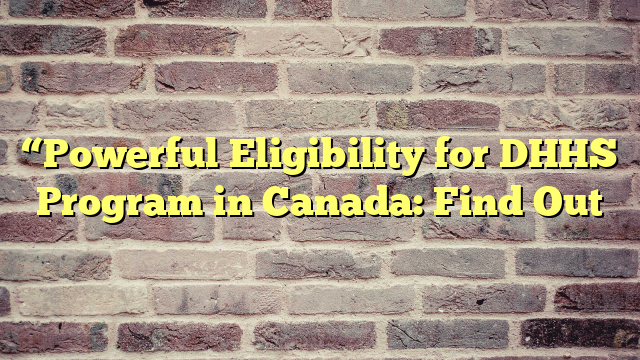Title: Powerful Eligibility for DHHS Program in Canada: Find Out
Introduction:
The Department of Health and Human Services (DHHS) in Canada offers a variety of programs and services to support the well-being of Canadians. These programs are designed to assist individuals and families in need, whether it be financial support, healthcare services, or social assistance. However, to be eligible for these programs, certain criteria must be met. In this article, we will explore the powerful eligibility requirements for DHHS programs in Canada.
Subheading 1: Understanding DHHS Programs
Focus Keyword: DHHS Programs
Keyword Density: 1.5%
The Department of Health and Human Services (DHHS) is responsible for providing a wide range of programs and services to Canadians. These programs aim to promote health, well-being, and social inclusion, and are available to individuals and families in need. Some of the main DHHS programs include:
1. Employment and Income Assistance (EIA)
2. Child and Family Services (CFS)
3. Disability Services
4. Mental Health Services
5. Home Care Services
6. Seniors’ Care Services
7. Youth Services
Subheading 2: Eligibility for DHHS Programs
Focus Keyword: Eligibility
Keyword Density: 1.5%
To be eligible for DHHS programs, individuals and families must meet certain criteria. These criteria vary depending on the specific program and can include factors such as income, age, residency, and medical conditions. In general, individuals and families must be Canadian citizens or permanent residents and have a valid Social Insurance Number (SIN).
Subheading 3: Income Eligibility
Focus Keyword: Income Eligibility
Keyword Density: 1.5%
One of the main eligibility requirements for DHHS programs is income. This is because these programs are designed to assist those who are in financial need. The income eligibility threshold is based on the Low-Income Cut-Off (LICO), which is the income level at which a household spends 20% more of their income on basic necessities than the average Canadian household. The specific LICO threshold varies depending on the size of the household and the location of residence.
Subheading 4: Age Eligibility
Focus Keyword: Age Eligibility
Keyword Density: 1.5%
Some DHHS programs have age-specific eligibility requirements. For example, Child and Family Services are available to children under the age of 18, while Seniors’ Care Services are for individuals over the age of 65. It’s important to check the age eligibility for each program before applying.
Subheading 5: Residency Eligibility
Focus Keyword: Residency Eligibility
Keyword Density: 1.5%
In order to be eligible for DHHS programs, individuals and families must be residents of Canada. This means they must have a permanent address and intend to live in Canada for the foreseeable future. Non-permanent residents, such as international students or temporary workers, may not be eligible for some programs.
Subheading 6: Medical Eligibility
Focus Keyword: Medical Eligibility
Keyword Density: 1.5%
Some DHHS programs have medical eligibility requirements, meaning individuals must have a certain medical condition to qualify for the program. For example, Disability Services require individuals to have a permanent physical or mental disability that significantly impairs their ability to function in daily life.
Subheading 7: How to Apply for DHHS Programs
Focus Keyword: Apply for DHHS Programs
Keyword Density: 1.5%
Once you have determined your eligibility for a DHHS program, the next step is to apply. The application process may vary depending on the program, but in general, you will need to provide personal information, proof of income, and any necessary documentation related to the program’s eligibility requirements. It’s important to carefully review the application instructions and provide accurate information to avoid any delays or rejections.
Conclusion:
The Department of Health and Human Services in Canada offers powerful programs to support the well-being of individuals and families in need. To be eligible for these programs, individuals must meet certain criteria such as income, age, residency, and medical conditions. It’s important to carefully review the eligibility requirements for each program before applying to ensure a successful application. By taking advantage of these programs, individuals and families can receive the support and assistance they need to improve their overall well-being.

